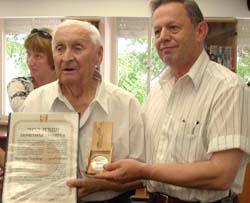
Nikolay Leschinger receiving medal and certificate from Dr. Mordecai Paldiel, Director of the Righteous Among the Nations Department

Pictured here is Yekaterina Panchenko Movchan receiving a medal and certificate from Dr. Mordecai Paldiel

Anatoly Biriukov, the grandson of Raisa Makarevich, receiving medal and certificate from Dr. Mordecai Paldiel, Director of the Righteous Among the Nations Department
09 June 2002
Yad Vashem held Righteous Among the Nations ceremonies on June 9, 2002, honoring:
Nikolay Leschinger, who witnessed the deportation of Odessa Jewry in December 1941, saved the life of young Jewish boy Aleksander Gilerman who, in an attempt to escape from the convoy, had been injured by gunshots and lay bleeding on the road. Leschinger pulled him to safety, nursed him back to health in his own home, and kept Gilerman hidden until the end of the occupation in April 1944. Aleksander remained in Odessa until 1979, when he immigrated to the United States. Nikolay Leshinger, who recently immigrated to Israel with his two Jewish daughters, today lives in the town of Bet Shemesh, and participated in the ceremony.
During the war Yekaterina Panchenko Movchan, lived in Krivaya Ruda, a small village in the Poltava region of East Ukraine with her mother and two sisters. With the German occupation of the area, the Jewish mother of a local family (Kachan) was deported with her baby and killed. On their return home that same evening the Kachan’s remaining two young children, Pavel aged seven and two-year-old Nina, were taken in by the Panchenko family where they were hidden until liberation in September 1943. During their period in hiding the police conducted searches for the children suspecting that they were being hidden by locals, however when they reached the Panchenko’s home, Pavel and Nina had already been moved to the cellar where they were being cared for by Yekaterina and her sister, Polina.
After the war the children’s non-Jewish father, who had been a member of the partisans, returned to the village, remarried a local woman, and the children were raised as Ukrainians. The Kachan family still live in Krivaya Ruda.
Yekaterina, who today lives in Yerocham, Israel with her daughter and her Jewish son-in-law, participated in the ceremony.
During the German occupation Raisa Makarevich and her motherFeokla Levitkaya gave shelter to the Roitenburd family (including two children) in their Mogilev-Podolski home, until the establishment of the city’s ghetto - where their third child was born in 1942. Raisa and her mother continued to make sure that the family received food, even during the family’s incarceration in Ghetto Mogilev-Podolski. In 1942 Raisa and her mother gave shelter to the local butcher and his daughter, and on a number of occasions during 1942 the Roitenburd family returned to the house. During the last weeks of the occupation, when the Red Army was already at the entrance to the city, the Roitenburds, fearing for their lives, were once again taken in by their saviors. The Roitenburd family stayed with Raisa and Feokla until liberation in March 1944.
After the war the Roitenburd family immigrated to Israel.
Anatoly Biriukov, the grandson of Raisa Makarevich, accepted the award on behalf of his grandmother and great-grandmother who are no longer alive. Fanya Roitenburd, one of the survivors, also took part in the ceremony.






